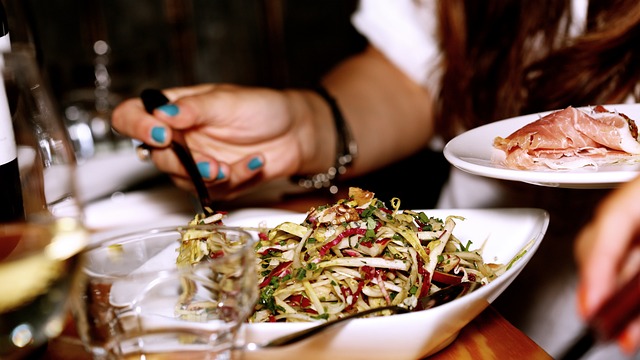By Dr. Jennifer Forney, Forney Wellness Group, LLC
None of us is perfect. (Nor should we strive to be.) But most of us could use a better relationship with food.
When was the last time you sat down to eat without stress, guilt or second-guessing every bite? If the answer is “I can’t remember,” you’re not alone. Many of us have a complicated relationship with food, shaped by years of societal pressures, diet trends and well-meaning but misguided advice.
But here’s the good news: it’s never too late to cultivate a healthier, more peaceful relationship with food. What does this look like? Well, that depends on the individual person. It could mean giving yourself grace to indulge every once in a while. It could mean preparing weekly meals more mindfully, or growing your understanding which foods are the best fuel for your body.
Let’s dive into what that looks like and how to get there.
What Does It Mean to Have a Good Relationship with Food?
First, let’s clarify: a good relationship with food isn’t about the specific foods you eat or the number on the scale. It’s about how you think about, approach and experience food. A healthy relationship with food involves feeling free to eat what you enjoy, tuning into your body’s natural hunger and fullness cues, and releasing any guilt or shame tied to your choices.
Food is more than just fuel. For people, it’s one of the elements of life that brings pleasure and joy. A meal can honor culture, tradition and human connection. When you embrace that perspective, you open the door to a balanced, fulfilling way of eating that supports your physical and emotional well-being.
Oftentimes, that requires the guidance of a nutrition coach to provide expertise, as well as perspective on the physical act of eating and the accompanying emotional experience.
Signs Your Relationship with Food Needs Work
If any of the following resonates with you, it might be time to reassess your relationship with food:
- You ignore your body’s hunger signals or push past fullness.
- You find yourself stuck in cycles of restriction and bingeing.
- You feel guilty after eating certain foods.
- You label foods as “good” or “bad.”
- You overuse apps or calorie counters to dictate your eating and meal planning.
- Social eating feels stressful or anxiety-inducing.
These patterns are more common than you might think, but they don’t have to define your story.
Steps to Improve Your Relationship with Food
Building a healthier connection with food takes time and patience, but every small step forward counts. Here’s where to start:
1. Listen to Your Body
Your body is incredibly intuitive. But I always find it funny (or sad?) how infrequently people listen to it. Your body knows when it’s tired. So you sleep. Your body knows when it’s in pain. So you take it easy.
Your body knows when it’s hungry and when it’s satisfied. But diet culture, bad habits and external rules can drown out those signals.
Start reconnecting with your body by tuning in during meals. Ask yourself:
- Am I eating because I’m hungry, or because I’m bored or stressed?
- How does this food taste? Does it satisfy me?
- Am I still hungry, or have I had enough?
This practice, often called mindful eating, takes time to master, but it’s one of the most powerful tools for repairing your relationship with food. And on that note …
2. Practice Mindful Eating
Mindful eating is about being fully present during meals. Put away your phone, turn off the TV and take a moment to savor each bite. Notice the flavors, textures and how the food makes you feel.
Mindful eating isn’t just about slowing down. It’s about curiosity. It’s about self-reflection and introspection. Why did you choose this food? Is it meeting your needs? By observing without judgment, you can start to identify patterns and make choices that genuinely serve your health and wellness.
3. Grant Yourself Permission to Eat – Unconditionally
One of the biggest barriers to a healthy relationship with food is restriction. When you tell yourself certain foods are off-limits, those foods often take on an almost mythical allure. You start craving them more, and when you finally give in, it’s easy to overdo it.
By giving yourself unconditional permission to eat what you enjoy, you take away the power those foods hold. This doesn’t mean eating cookies for every meal — it means trusting that no single food will make or break your health.
If you’re reading this blog, presumably, you’re an adult or can at least make adult decisions. No one’s telling you not to eat that bag of chips. Similarly, no one’s saying you can’t leave the table until you eat all your carrots. You have the power to choose to eat healthy, or to sometimes enjoy comfort foods without restriction.
4. Challenge Food Rules
Rules like “no carbs after 7 p.m.” or “only eat clean foods” might seem harmless, but they create unnecessary stress and restrict your freedom. Take some time to identify the rules you’ve been following, and gently question them.
For example, if you’ve labeled pizza as “bad,” ask yourself: why? Sure, pizza isn’t a daily staple, but it’s also not a villain. Enjoying a slice with friends can nourish your soul in a way that kale never will — and that’s just as important.
(You get the jist: there’s nothing wrong with the word “sometimes.”) Which segues nicely to the next point.
5. Ditch the ‘Good’ & ‘Bad’ Labels
When you categorize foods as good or bad, you give them emotional weight they don’t deserve. This can lead to guilt when you “break the rules” or even feelings of failure.
Instead, view all foods as neutral. Some are more nutrient-dense and support long-term health, while others are purely for pleasure — and both have a place in a balanced diet.
Nutrition Coaching: The Role of Professional Support
Let’s be honest: this journey isn’t always easy. Years of diet culture and ingrained habits can be hard to unlearn. It can even be tough to build a baseline understanding of nutrition and how the right diet must attune to individual body types, genetics, emotional wellness and mental preparedness, among numerous other factors..
Without a nutrition coach, that is.
A nutrition coach can make all the difference. Throwing a licensed mental health therapist into the mix would also be wise. These professionals can help you explore the root causes of your struggles with food, provide personalized strategies and offer the support you need to make lasting changes.
As always, remember: progress, not perfection. Improving your relationship with food is not about flipping a switch — it’s about making gradual, sustainable changes over time. Be kind to yourself, celebrate small wins and remember that perfection isn’t the goal. The goal is freedom to enjoy food without guilt, nourish your body with intention, and live a life where food is a source of joy, not stress.
So, the next time you sit down to eat, take a deep breath, let go of the rules and savor the moment. You deserve it. As always, feel free to schedule a free nutritional consultation with me here or reach out directly at [email protected].




